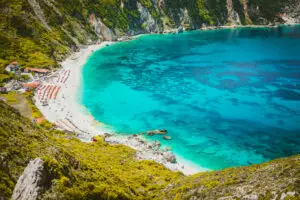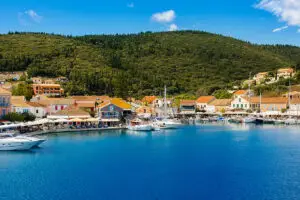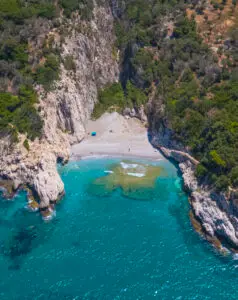
Ionian Sea Islands: The Complete Guide
Ionian Sea Islands: The Complete Guide for Sailors & Smart
Santorini is one of the most visited and visually striking destinations in Greece. Known for its cliffside villages, volcanic beaches, and romantic sunsets, this Cycladic island attracts millions of travelers every year. Whether you’re planning a luxury escape, a cultural adventure, or a sailing trip through the Aegean, Santorini delivers unforgettable experiences.
This comprehensive guide includes everything you need to plan your trip: how to get there, where to stay, what to do, when to go, and answers to the most frequently asked questions.
Santorini is a volcanic island in the southern Aegean Sea, part of the Cyclades archipelago
in Greece. Formed by a massive volcanic eruption over 3,500 years ago, the island’s unique crescent shape surrounds a submerged caldera, creating dramatic landscapes that have become iconic in travel photography.
Santorini includes several villages built along the caldera cliffs, such as Fira, Oia, Imerovigli, and Firostefani, each offering panoramic sea views, traditional Cycladic architecture, and luxury accommodations.
Santorini sunsets, especially from the village of Oia, are among the most famous in the world. Tourists line up daily to watch the sun disappear behind the Aegean, casting brilliant hues over the island’s whitewashed buildings and blue-domed churches.
Unlike most Greek islands, Santorini has volcanic sand beaches. Highlights include:
Red Beach: Stunning red cliffs and pebbled shoreline near Akrotiri.
Kamari & Perissa: Long, black-sand beaches ideal for swimming and beach bars.
White Beach: Accessible by boat, surrounded by white volcanic cliffs.
Santorini is known for its cave houses built directly into the cliffs. The island’s architecture is not only beautiful but also practical, providing insulation from summer heat and winter cold.
Santorini’s volcanic soil gives local products a distinct flavor. Try:
Assyrtiko: A dry white wine native to Santorini.
Fava: A creamy yellow split-pea puree.
Tomatokeftedes: Local tomato fritters made with Santorini’s famous cherry tomatoes.
Explore the island’s wineries on a tour or visit Santo Wines
for tastings with a view.
Santorini is ideal for honeymoons, weddings, and romantic getaways. Its cliffside hotels offer private pools, luxury service, and direct views of the caldera.
For tailored yachting experiences, consider booking through the island’s local skipper and sailing options
By Plane
Santorini (Thira) International Airport receives:
Daily flights from Athens (50 minutes)
Seasonal direct flights from major European cities
By Ferry
Ferries run from Piraeus (Athens) and other islands such as Mykonos, Naxos, and Paros. High-speed ferries take 4.5 to 6 hours from Athens, depending on weather and service.
| Season | Weather | Crowds | Notes |
|---|---|---|---|
| April–June | Warm & dry | Moderate | Ideal for sightseeing and hiking |
| July–August | Hot & sunny | High | Peak season, great nightlife, crowded |
| September–October | Warm, fewer tourists | Medium | Perfect for beach days, wine tasting |
| November–March | Cool, some rain | Low | Quiet, many hotels closed |
Oia: Best for sunsets and boutique hotels
Imerovigli: Quiet luxury with panoramic views
Fira: Central location, restaurants, nightlife
Kamari & Perissa: Beach resorts, family-friendly, affordable
Book early (6+ months in advance) if traveling between May and September.
Hike from Fira to Oia: A 3-hour scenic walk along the caldera cliffs.
Caldera Cruise: Visit the volcano, swim in hot springs, enjoy dinner at sea.
Ancient Akrotiri: A Minoan city preserved in volcanic ash—Santorini’s Pompeii.
Visit a Winery: Book a tour and tasting at Santo Wines or Venetsanos.
Swim at Ammoudi Bay: Below Oia, with crystal-clear waters and tavernas.
Explore Pyrgos Village: Traditional and less touristy, with panoramic views.
Watch the Sunset from Oia Castle: A classic Santorini experience.
Yes, especially in peak season. However, budget accommodations and off-season travel can significantly reduce costs.
3 to 5 days is ideal to explore the main villages, beaches, and cultural sites.
No, tap water is not drinkable. Bottled water is widely available.
Yes. While it’s known for romance, beach areas like Kamari are family-friendly.
Oia for romance, Fira for convenience, Imerovigli for luxury and quiet, Kamari for beach vibes.
Yes, daily ferries connect Santorini to Mykonos, Naxos, Paros, and Athens.
Very safe for tourists. Usual travel precautions apply.
Yes. You can hike the Nea Kameni volcano as part of a caldera boat tour.
The Euro (€). Credit cards are widely accepted.
Yes, especially in tourist areas. Most locals in hospitality speak fluent English.
Whether you’re visiting for the views, the culture, or the cuisine, Santorini offers one of the most memorable travel experiences in the world. From cliffside sunsets to sailing adventures, the island’s magic lies in its contrasts—natural beauty paired with human history, rugged cliffs alongside serene waters.
Learn more about Santorini’s culture and travel options on this official island page
or browse tailored skipper and sailing experiences in Santorini
to customize your journey.

Ionian Sea Islands: The Complete Guide for Sailors & Smart

Kefalonia is one of Greece’s top sailing destinations, combining calm

The Authentic Samos Island Samos isn’t your typical “cookie-cutter” Greek
Contact Us Now to Create Your Dream Sailing Itinerary [email protected]